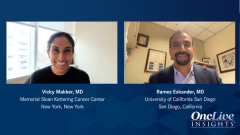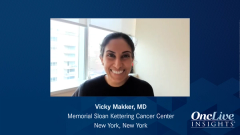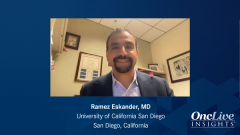
Treatment Modification Rates for Combination Lenvatinib/Pembrolizumab
A brief review of treatment interruption, discontinuation, and dose modification rates in patients receiving combination lenvatinib/pembrolizumab in the KEYNOTE-775 trial or in the experts’ clinical practice.
Episodes in this series

Transcript:
Ramez Eskander, MD: We think about treatment, and I think it’s only fair for us to think about treatment-related adverse effects when we treat patients on this regimen. With the initial publications, there was some discussion regarding lenvatinib as a TKI [tyrosine kinase inhibitor] is hard to give sometimes and patients may not tolerate it, but I do think that when we usher in new treatment options for patients, it takes us as clinicians a bit of time to get used to a treatment strategy.
Vicky Makker, MD: Of course, I absolutely agree. You’ve now obviously garnered a great deal of experience with this regimen. How do you think about AE [adverse event] management with this combination, and what are your overall thoughts about this?
Ramez Eskander, MD: On KEYNOTE-775, when patients were treated, of course clinical trials are unique in that the criteria for discontinuation or dose interruption or dose reduction are very clearly outlined for the purposes of the study. If you look at the data from the trial, adverse events of any grade that led to a dose reduction of lenvatinib occurred in about 66% of patients who were treated on trial, interruption of lenvatinib in 69% of patients treated on trial, and discontinuation in 33%. But if you look at discontinuation of both lenvatinib and pembrolizumab, that occurred in a smaller percentage of 14% of patients. I’ll take a moment to say, even when you looked at treatment of physician’s choice, the discontinuation rate due to drug-related adverse events was about 8%. So 8% vs 14% in the combination, and again, this is in the context of the trial with very specific criteria.
The other thing is we don’t think twice about dose interruption and dose reduction with some of our other anticancer-directed therapies, chemotherapy most commonly used. We need to evolve our way of thinking analogously for these novel drugs that we are incorporating in the treatment of our patients with GYN [gynecologic] malignancies. So I tell my patients we’re going to start you on this regimen, but if I need to hold the dose or I need to reduce the dose, we’re going to do so with a goal to keep you on therapy because we know that this could potentially be an effective treatment option that you may be able to stay on for a long time.
Anecdotally, of course, I just saw a patient last week in the clinic. She’s been on this regimen for over 2 years, and she’s become so adept at identifying,“I’m not feeling really well right now. I’m going to hold my lenvatinib for a week.” Then we revisit, we talk to each other, and like I said, she’s been on it, so we’ve had to dose reduce, we’ve had to dose interrupt, which I think is an acceptable, anticipated occurrence on this regimen. But she’s been on it, and has benefited. She’s a patient with clear cell carcinoma, with no biomarker in the context of the biomarkers that we’ve previously reviewed, but has had a really profound and dramatic response. So I think education is important, empowering the patient and the providers to understand you can dose reduce, you can dose interrupt. I don’t think that we should shy from doing those things because ultimately, at the end of the day, it’s about offering our patients an effective treatment opportunity. I don’t know if you guys view it the same way, but I anticipate that many of us do.
Vicky Makker, MD: Yes, you actually took the words right out of my mouth, and I think we have a very similar philosophical approach.
Transcript edited for clarity.







































